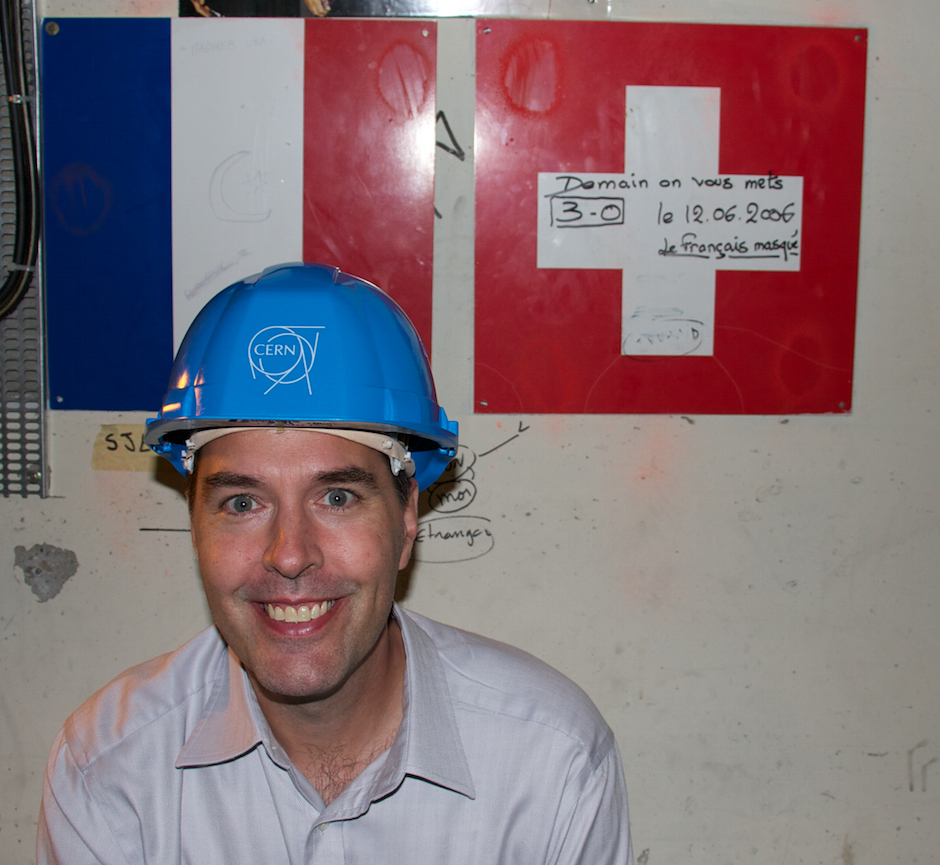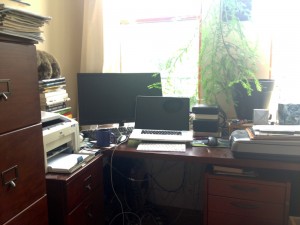
Where I work:
I work in a home office in Brooklyn. Ars Technica runs online: we have a virtual office in an IRC channel and a staff-only IM server. I’m also available via Skype and Gtalk, since a lot of the writers are freelancers and don’t have access to the staff resources. Even though Ars is owned by Condé Nast, which is based in New York City, I’ve probably been in the corporate offices an average of less than once a year.
My home office has a desk, and I use that a lot of the time. I’ve got a tall filing cabinet that I can put my laptop on so I can read while standing. And, weather permitting, I spend some time on my balcony, which is lovely in the spring and fall (but too hot or cold in the other seasons). I’ve got enough focus that I can work on the subway or in parks and coffee shops, so I try to do a bit of that too, just to make sure I don’t end up feeling trapped in my office.
I love working at home, but I also like the people I work with. So it’s a bit of a shame that I only get to see most of them during our annual staff meeting.
Daily routine:
I start the day somewhere between 8 and 9 a.m., usually by checking email and going through the RSS to see if anything happened overnight that I need to know about or respond to. My managing editor is in Chicago, and typically comes online while this is happening—he usually finds a story or two that he thinks I should be aware of. When I’m up to date, I check to see whether any freelancers have left me presents in our content management system. If so, I’ll typically edit those and hand them to my managing editor for copyediting and publication.
Usually by 10 or 11, I’m set to work on whatever stories I’m going to write. Since I’m an ex-biologist, I can usually breeze through research and writing in that subject area, but often I find I’m writing about astronomy or materials science, and these can be a bit more of a struggle. Also in the “struggle” column are large, sprawling reports like the ones from the National Academies or the International Energy Agency.
So, depending on how quickly I’m productive and how many articles we publish on a given day, I may continue on by writing a second story or by switching to a longer-term project, like a feature I am writing or need to edit. Plus there are always things that come up and have to be dealt with, and I’m perpetually behind on email. So there’s never a moment where I am sitting around wishing I had something to do. No matter how much I feel I’ve got left to do, though, I try to wrap up around 7 p.m. and leave myself time for a walk or doing some housework before starting on dinner.
Most productive part of my day:
The late morning, once I’ve cleared out all the overnight stuff and can focus on a story.

Sleep schedule:
Ideally? 11 to 7. Reality generally deviates from the ideal for all sorts of reasons.
What I’m working on:
I’ve always got a backlog of stories I’d love to write. Right now, my top interest is to follow up on some things I came across at a particle collider conference at Columbia University last month. But I’ve got other stories that are closer to completion, and I should probably finish off a few of those first.
For the science section in general, I’m working on bringing in a few people new to writing to try their hand at freelancing for us. Ars gave me the chance to transition to my current job when I was still in research, and we’ve tried to keep that as a possibility for others. And we get people who are interested in testing the waters of writing as a possible career, or want to have the chance to communicate with a much larger audience than they’d get by starting a blog.
But this means our writers often get sucked back into their research careers (writing a thesis or grant is pretty common). Plus a few have done well enough that they can move on to places that pay better than we can, or used their writing experience to move on to a career in policy.
So we bring in new people fairly regularly. It’s always a lot of work to get them all set up with our system, and sometimes a lot of work to help them develop their writing skills. But it’s also a lot of fun to watch them get comfortable writing and start developing their own voice.
Most essential ritual or habit:
Delaying things like my shower or errands until I feel like I’m stuck or just losing focus. I find if I’m not productive, I’m not going to will myself to productivity. So I take a break to reset my brain.

Computer:
Several. For working around my apartment, I have a 17″ MacBook Pro, which Apple has sadly discontinued. I’m a screen real estate junkie, and this gives me my fix when I’m out on the balcony or I perch it on a filing cabinet. But it’s a bit bulky for travel, so I have an official Ars-issued MacBook Air. I also keep a Mini around for testing out beta software and programming—if I completely mess it up, it’s ok. That also has a spam filter running on my email accounts so I don’t have to deal with spam on my smartphone.
Mobile device:
Said smartphone is an iPhone 5. I use several of the smartphone features regularly (email, Twitter) but the biggest benefit is using it to give my laptop internet access in parks and such. It lets me work just about anywhere.
Essential software/apps/productivity tools:
I use Net News Wire as my RSS reader. It’s great, but the 4.0 version kills a few features I rely on, so I’m hoping the 3.x series keeps working with the latest operating system for a while. As I mentioned above, I also rely on IM and Skype to make sure I’m available to freelancers. Skype with Call Recorder is how I do my interviews.
Most of the editing I do happens in our CMS with a browser. If I’m working closely with a writer on either a specific piece or writing in general, we’ll exchange Word documents with changes tracked.
For my own writing, I just use BBEdit, which is a plain text editor. We’ve switched CMSes a few times over the years, and I find it’s more reliable to make sure things look like you want them to when you’re writing in HTML. I take notes using TextEdit, just to keep the notes separated from the writing, which makes it easier to manage in terms of keeping track of files.
I also can’t say enough about my home server, which comes from Synology. It’s got software a bit like Dropbox, but with as much capacity as you are willing to buy disks for. The same system holds my backups and has a web server for sharing large files. I can add accounts to let freelancers upload image collections. It’s really like a Swiss army knife for shifting digital stuff around.
Favorite time waster/procrastination habit:
These days, computer games seem to take longer to load than the operating system does. So I’ve taken to playing iPad games, which are mostly running in a matter of seconds. I tend to enjoy what are called “tower defense” games, like Plants vs. Zombies and Kingdom Rush. Games mostly give my brain a chance to shut off for a bit, and I’m not convinced that’s a waste of time. Walking—either around the neighborhood or in one of the local parks—does the converse: gives me the space to think for a while.
My reading habits:
I do so much reading during my regular work that I no longer view it as a relaxation activity. I’ll read when I retire.


